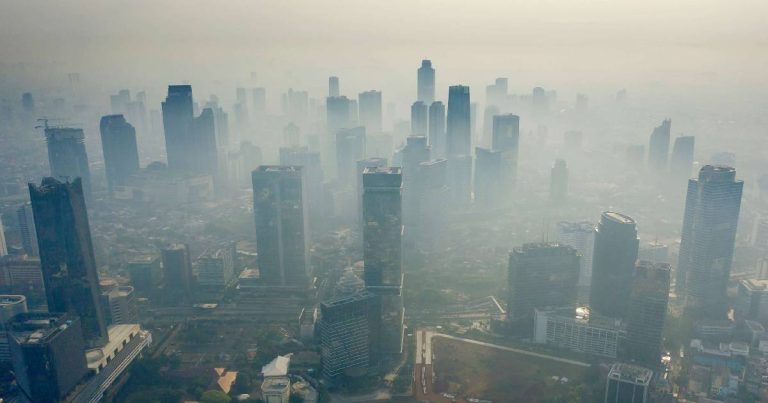11-8-2023 (JAKARTA) The Indonesian capital has been named the most polluted city in the world, according to air quality monitoring firm IQAir. Jakarta and its surrounding areas, home to about 30 million people, have seen a surge in the concentration of PM2.5, tiny particles known to be harmful to human health. The city’s air pollution levels have outpaced those of heavily polluted cities such as Riyadh, Doha and Lahore in recent times.
The government has attributed the recent spike in pollution to weather patterns and vehicle emissions. Senior environment and forestry official Sigit Reliantoro told reporters on Friday that the high levels of pollution between June and August were due to seasonal wind changes. He said, “In June, July and August, there is invariably an escalation in air pollution in Jakarta due to the dry air.”
Activists, however, blame the high levels of toxic smog on clusters of factories and coal-fired power plants located near the city. Greenpeace Indonesia has said that there are 10 such power plants within a 100km radius of Jakarta.
President Joko Widodo recently warned of a long, dry summer season in Indonesia that could lead to dangerous weather conditions and wildfires across the archipelago nation, blaming it on the El Nino global weather phenomenon. He stated that the pollution spikes could be managed by building better public transport and shifting some of the economic and industrial burden from Jakarta to Nusantara, the new planned Indonesian capital set to open its doors next year.
This week’s spikes in PM2.5 levels were so severe that Jakarta topped Swiss company IQAir’s live ranking of air pollution in major cities at least once every day from Monday to Thursday. According to the government’s research, vehicle emissions account for 44% of air pollution, followed by the energy industry with 31% and manufacturing with 10%, said Reliantoro. He appeared to blame older, more polluting vehicles for high levels of emissions, stating that the government had implemented “periodic enforcement” of emissions tests for vehicles but there was not enough help from authorities outside Jakarta.
“Air pollution in the capital cannot be tackled alone by the Jakarta administration; it must involve surrounding areas,” he said.
The Indonesian government has faced increasing pressure from environmentalists to address the issue of air pollution in Jakarta. The city’s poor air quality has been linked to a range of respiratory illnesses, including asthma and lung cancer, and has been estimated to cause more than 10,000 premature deaths in the city each year.
Efforts to reduce air pollution in Jakarta have included the installation of air quality monitoring stations and the implementation of a car-free day in the city center on Sundays. However, these measures have been criticized for being insufficient to tackle the scale of the problem.
The government’s recent announcement of plans to move the capital from Jakarta to Nusantara has been viewed by some environmentalists as an opportunity to address the issue of air pollution in the city. However, it remains to be seen whether the move will lead to significant improvements in air quality in Jakarta.




